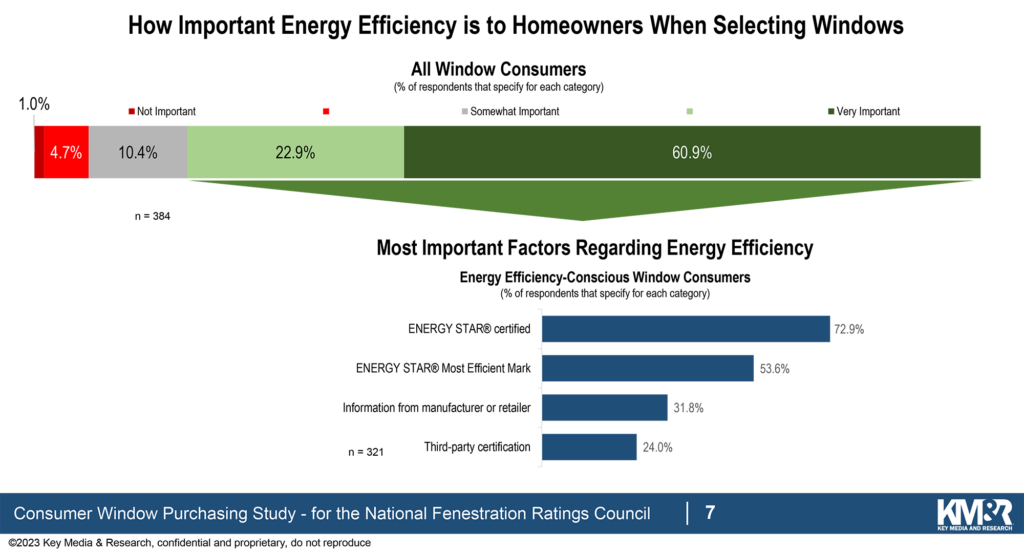Many homeowners consider energy-efficient windows to be an important factor.
Window shoppers – people buying windows for their homes – are discerning shoppers.
While price is often the main deciding factor, homeowners also want to know about a window’s energy efficiency and the potential savings on their energy bills, according to a recent survey of consumer buying habits.

Our parent company, the National Fenestration Rating Council (NFRC), commissioned Key Media & Research to poll homeowners who purchased new windows in the last two years and those who plan to purchase new windows in the next year. Researchers asked these consumers where they looked for information about options for selecting and purchasing windows.
Perhaps unsurprisingly, half of the homeowners who recently bought windows said they found information at a big-box store such as Home Depot and Lowes. At the same time, those shopping for and looking to buy new windows said they went to the website of a window retailer. They didn’t spend a lot of time researching their impending window purchase.
The majority of those who recently bought windows said they spent only one to three hours researching online, and nearly half of those shoppers took less than four weeks to buy their windows once they started the process. On the other hand, would-be window consumers said they expect to spend more time – up to two months – researching windows before buying. This suggests homeowners go into the window-shopping process expecting it to take longer than it does and perhaps are finding what they’re looking for quicker than anticipated.
What does this mean? Well, it implies that homeowners are getting the right information they need and feel confident buying new windows. Energy efficiency is a factor in those decisions.
One of the resources for determining a window’s energy efficiency is the Efficient Windows Collaborative. In fact, homeowners in the survey said they found the Efficient Windows Collaborative’s Window Selection Tool useful and user-friendly. To use the tool, homeowners enter their ZIP code and answer a few questions about their home to receive a list of windows that meet ENERGY STAR® requirements in their location. The tool also provides information on indoor comfort and annual energy costs. Overall, window consumers rated the Window Selection Tool as easy to use and helpful.
According to this survey, both homeowners who recently purchased windows and those still shopping (84%) said energy efficiency was a top priority. Both groups also rated energy bill savings as the most helpful information when shopping for windows. Of those consumers, a majority view ENERGY STAR certified and ENERGY STAR Most Efficient as key factors in their decisions.

As is the case for household appliances such as washers and dryers, the ENERGY STAR label on windows gives consumers peace of mind when making such an investment in their homes. NFRC’s FenStar® Certification Program is certified by the EPA to rate and verify windows for ENERGY STAR.
When homeowners were asked what information they wished they had, both groups said an annual energy rating and the ability to compare current windows to new windows would be helpful. This further emphasizes the findings that energy efficiency is essential to homeowners when selecting windows.
In line with the desire for cost savings, two-thirds of recent window customers say they knew about rebates and tax credits for new windows before making their purchase. When looking at awareness of these incentives among those who plan to purchase windows, the results flip, with roughly two-thirds saying they are unaware of any of these programs.
This suggests that many homeowners don’t know about rebates or tax credits when starting the window-shopping process. However, awareness essentially doubles before they make a purchase, meaning they are learning of these options between the time they begin looking for windows and the time they buy them. There are likely tax credits and rebates available from the federal, state, and local governments and utilities, which can help homeowners recoup some of their costs. Check out the EWC’s financing and incentives page for more details.

From these surveys and others like it, it’s apparent homeowners value energy efficiency because they want to pay less to heat and cool their homes, feel comfortable and healthy indoors, increase the value of their homes, and help the planet.
With the Efficient Windows Collaborative and its Window Selection Tool, shoppers have the resources and information to make smart decisions when buying new windows and, along with financial incentives, can make energy efficiency a priority for their home.
Written by Michelle Blackston.
